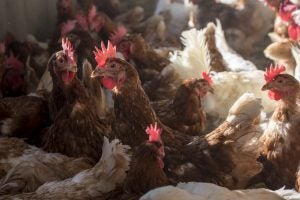-

HSI
KATOWICE, Poland–At the United Nations’ global climate change conference, COP24, animal welfare charity Humane Society International and Israeli environmental organization Green Course held an official side event that brought together experts and policymakers to discuss pathways to incentivise plant-based diets and reduce reliance on meat, dairy and egg products from animals housed in intensive factory-farming environments. The Mitigation Potential of Plant-based Diets: From Science to Policy gave delegates a toolkit of policy recommendations and inspiration to see them implemented.
The focus of the panel was summed up by Florent Marcellesi MEP, “If we are what we eat, nowadays we are climate change. Around 15 percent of greenhouse emissions come from animal farming, almost as much as cars and planes. This is the result of our current unsustainable food system, based on the overproduction of low-cost meat. This means huge consequences over the climate, but it also impacts our health, the lives in rural areas and the animal welfare. Civil society is already organising to fight against the low-cost meat industry and its impacts, but we need policy measures. Let’s build an ecological food system that creates good quality jobs while protecting the climate, our health and the animals.”
With the key message that we must take action to ensure a sustainable future, Marie Persson of the Nordic Food Policy Lab said, “Governments play a key role in facilitating the necessary shift to healthy and low-climate impact diets. In the Nordic countries sustainable and healthy diets are moving up the agenda and while we are not seeing very harsh regulation, soft policy tools working in tandem with changing consumer preferences are proving to be a recipe for success.”
Give now to help animals all over the world.
Dr. Marco Springmann from the Oxford Martin Programme on the Future of Food at the University of Oxford highlighted the need for dietary changes to stay within planetary boundaries of the food system, saying, “Without large-scale dietary changes towards more plant-based diets, there is little chance to avoid dangerous levels of climate change. Incentivising such dietary changes will require integrated, multi-component approaches that include providing information, access, and setting clear economic incentives. Important starting points would be to update national dietary guidelines to reflect the latest scientific evidence on healthy and sustainable diets, explore the use of full cost accounting of foods, and align agricultural policies with health and sustainability concerns.”
Dr. Cristina Tirado, director of International Climate Initiatives for the Center for Urban Resilience at Loyola Marymount University, said, “There are many opportunities to achieve co-benefits from actions that reduce emissions and at the same time improve health by shifting consumption away from animal products, especially from ruminant sources, in high-meat consumption societies, toward less emission intensive healthy more plant based diets, with more vegetables, fruits and pulses.”
Ifat Zur of Green Course said, “There is much policy discussion when it comes to sectors like transportation or energy, yet none relating to animal products. This is absurd, as the livestock industry is responsible for even higher greenhouse gasses than those other sectors, and livestock reduction involves several benefits on both individual and national levels. Policy should not only comply with research and public trends but also aim to take a leading role in the movement.”
The HSI/Green Course panel was the only event to directly address the implementation of national policies to shift towards more plant-based diets in order to combat climate change. And it was a message very much needed, as COP24’s meat- and dairy-focused menu options became the topic of much discussion amongst participants. HSI experts encouraged organizers of the massive two-week conference to replace its meat-dominated menus with more planet-friendly foods in the future, offering them culinary training on vegan cuisine from its Forward Food programme, which works with institutions and corporations to put more plants on plates.
Alexandra Clark, Humane Society International’s food policy consultant, said: “Industrial animal agriculture is a major cause of greenhouse gasses. While policies exist to reduce the climate impact of the energy and transport sector, Western governments have yet to adopt policies to reduce the climate impact of large-scale factory farming. Globally, 90 billion farm animals are raised for food each year – and the ramifications to the environment and animal welfare caused by the systems in which the majority of those animals are housed in are far too big to ignore. Governments must act. And with scientists warning that we are nowhere near on track to meet the 1.5 degrees necessary to avoid catastrophic climate change, it is critical that action is taken to move to more plant-based diets. COP24’s meaty menus symbolise the ostrich-like attitude of policy makers around the world. We hope they take us up on our offer of vegan culinary training to ensure that future climate change conferences offer more planet-friendly plant based food.”
Forward Food encourages universities, caterers, and other institutions to provide more plant-based options as the number of people wanting meat-free and dairy-free meals increases rapidly. In the UK, the programme is led by HSI’s Forward Food Chef, author and 2016 UN Special Ambassador for pulses, Jenny Chandler.
Speaking at the COP24 event, Chandler said “Everyone is seeing increased interest in meat-free eating and I love showing people that plant-based food can be really delicious and vibrant and not tasteless or worthy as is often assumed. HSI’s Forward Food programme is a fantastic way of getting chefs to embrace this trend and it feels great to be part of something that really can make a difference to people’s health, the environment and animal welfare.”
END
Media contact: Wendy Higgins, Director of International Media, whiggins@hsi.org





